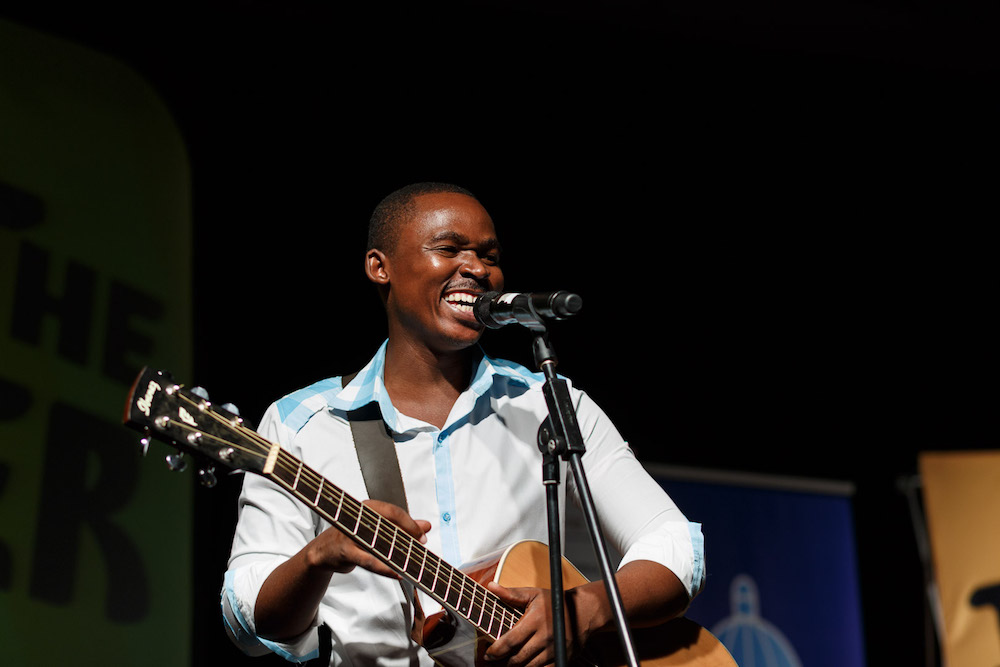Salim Washington's interviewing style during Notes on Music casts the connections between the written forms and music anew.
This year, all of Time of The Writer’s evening sessions have been prefaced by a musical segment called Notes on Music. While opening with music is an established tradition both at Time of the Writer and Poetry Africa, Notes on Music takes things a step further.
Here, musicians are asked to musically represent chapters of attending authors’ books. This year these musicians included Scelo Gowane, who drew from The South African Gandhi (by Ashwin Desai) and Zoe the Seed interpreting a beginning chapter of Nakhane Toure’s Piggy Boy’s Blues.
Salim Washington, a tenor saxophonist and a professor at the UKZN department of music, has made these sessions worthwhile with his pointed questions that seem to cast the connections between the written forms and music anew. Speaking to the Mail & Guardian, Washington shed a bit more light on his approach, the shortcomings and some of the unexpected surprises the process yielded.
Since the exercise at ‘Notes on Music’ is to interpret text and so on, what do you think is the relationship between music and scholarship?
Music is a kind of scholarship because at its best it is the result of a concentrated and prolonged study and preparation in the way that scholarship is but it is also more like literature because a large part of it is subconscious. So it has aspects of scholarship but it has things in it that transcend scholarship, because scholarship tends to be positivist in its orientation. It is dealing with facts, and verifiable facts at that whereas music can move beyond the positivist limitations of scholarship.
What is your role in instituting this segment of the programme?
My role is to try and marry these streams; the artistic, and the scholarly. I am profoundly influenced by literature and I am a musician. For me it is a natural fit. Many of my titles are based on literary works. I just got to interviewing Mandla Langa and all of his titles are based on poems. There is a fluidity between the various artforms. Dance could be put in there. Visual arts could be put in there. There is a way in which they comment on each other. In the black literary tradition, almost all of the writers are profoundly influenced by music. Sometimes they even find music as the model for how they want to engage their text. There is a lot in common in the artforms than might immediately occur to some of us.
In jazz this is particularly more so than in other forms?
I am tempted to say yes. With the usual caveat that things are varied and there are exceptions all over the place. Jazz is self-consciously intellectual in a way that many musics are not. I wouldn’t say that it is the only music, but it’s one of the hyper intellectual music forms especially since the Forties and Fifties when bebop formed.
How was this segment curated?
Sphephelo Mbhele of KZN Music Imbizo actually curated the artists. There is a partnership between the Centre for Creative Arts (which organises the festival) and the KZN Music Imbizo. So I was asked if I would be interested in the concept and I told [Centre for Creative Arts festival manager] Tiny Mungwe right away, absolutely. It is as though it was made for me.

Scelo Gowane speaks about the challenges of interpreting Ashwin Desai’s The South African Gandhi. (David Preston)
What were the limitations and some of the surprising outcomes of the exercise. Here I am making particular reference to songwriter Scelo Gowane whose interpretation of Ashwin Desai’s The South African Gandhi seemed rather polite when compared to the tone of the book?
I was able to push him a little bit, and then I got a better understanding of where he was coming from. It is something I call a Zulu politeness that won’t allow him to be caustic in the way that the author of the book was. It was not that he was unaware of the contradictions, it was that the way he dealt with it, was more oblique and more poetic.
I found that interesting because it wasn’t revealed when I first asked the question. I had to ask the question a few different ways in order to for me to understand what he really was saying. There is a sort of poetic brevity in lyrics that is profoundly different from writing a book. You have to invoke things through indirection. My own approach is through music which is liberating in a different kind of way.
By virtue of the instrument (saxophone) you play?
By virtue of the fact that I am not limited by words; by verbal logic. It has narrative but it cannot be necessarily pinned down with the specificity that words can.
What have you learnt, perhaps through this exercise, about a contemporary intellectual tradition among young South African musicians?
I have been writing from the other direction; Nthikeng Mohlele, Fred Khumalo, Wally Serote, Mandla Langa. Through them I have been looking at how jazz music figures in the literary imagination. I think you are asking me how literature figures in the musical imagination. I think that is an open-ended question for me and I am not sure if I can answer it at this point.
The writer’s accommodation and travel costs were covered by the Centre for Creative Arts.
Time of The Writer continues until Saturday, March 19. For more information, visit cca.ukzn.ac.za.